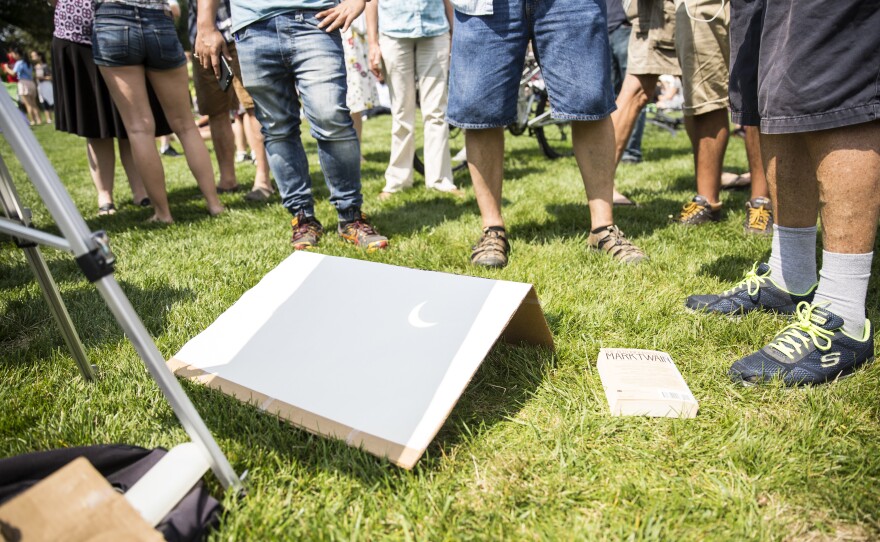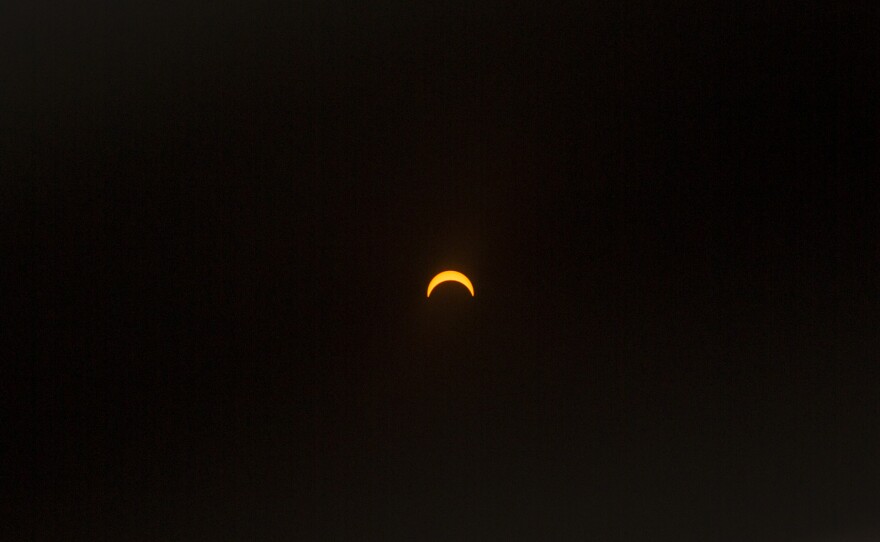In State College Monday, more than a thousand people gathered at Penn State’s arboretum to watch the partial solar eclipse. It started off cloudy, but those who stuck around got a good look at the eclipse.
People of all ages crowded the lawns of the arboretum with their eclipse glasses and pinhole viewers made of cereal boxes and paper plates.
T.J. Washington is a theatre major at Penn State. He and his friends were passing around one pair of solar glasses.
Washington says he’s wanted to see an eclipse his whole life and it was worth the wait.
“Yes, it was amazing,” Washington said. “When I first looked at it 30 minutes ago, it was like an orange circle. It was like you bit a cookie. It just was like a bigger bite in the sun every couple of minutes. And now it’s like literally the crescent of the moon, but it’s the sun. I don’t know, that’s just dope.”
Quenton Brown, a seventh-grader from Port Matilda, looked at the eclipse through a pair of solar glasses and kindly explained the eclipse to the people around him.
“A solar eclipse happens when the moon is in between the sun and the earth blocking the rays of light coming down,” Brown said.
And where did Brown get his scientific knowledge?
“I’d like to thank all my science teachers for this,” Brown said. “Mrs. Titus, Mr. Tranell, Mrs. de Carle, Mrs. Sheehan, even Mrs. Dillon, even though I don’t really remember much of your kindergarten class but thank you, still thank you.”
Penn State student Luke Henegar waited in line at the arboretum for the chance to see the eclipse through a telescope.
“It looks pretty cool,” Henegar said. “There’s a small little sliver left. We’re too far up to see in totality, or whatever, but it’s pretty cool. It’s like nothing I’ve ever seen before.”
Some of the viewers didn’t have their own eclipse glasses to bring to the event, and the arboretum’s supply was limited. Barbara Spencer of Stormstown, was happy with the generosity of those around her.
“I did not prepare myself for glasses,” Spencer said, “so I thought ‘Oh, I’ll go to the arboretum. There will be lots of people there with glasses and things to see,’ and I got to do that.”
Vijay Narayanan is a Penn State professor. He was at the arboretum with his wife, kids and a bunch of his kids’ friends.
“I think the best thing that we are telling today is we are a community, right?” Naranyanan said. “We are sharing one [pair of] glass[es] with about 20 people, complete strangers. So that is wonderful. This is what the country needs now.”
Robert Baillie has seen a total eclipse three times.
“It’s really an overwhelming experience. A very spooky experience because even if you understand the science, when the sun goes out and all of a sudden there’s a black hole where the sun used to be,” Baillie said. “It’s very easy to appreciate how terrified people must have been thousands of years ago when they didn’t know what was causing it.”
To see this eclipse, Baillie had a really big set of binoculars rigged up on a tripod to reflect the shadow of the sun down onto a white sheet of paper. The image was about three inches across, and a crowd gathered to look.
“It’s so cool that he did this because so many thousands of people showed up that there weren’t enough glasses. And we just happened to come across him and he’s been so generous,” said Margaret Blizzard, who had been watching Baillie’s binocular setup.
Michael Boguslaw, a student at Penn State, missed some of his first classes of the semester to watch the eclipse.
“I had to skip two classes to see this,” Boguslaw said.
Sabrina Syeda said she could not get enough of looking at the eclipse. She just finished her PhD in chemical engineering at Penn State. She’ll be leaving State College soon.
“I think this will be a great experience,” Syeda said. “I will cherish this memory forever.”
The next total solar eclipse in the United States will happen on April 8, 2024 and will cross the northwest corner of Pennsylvania.







